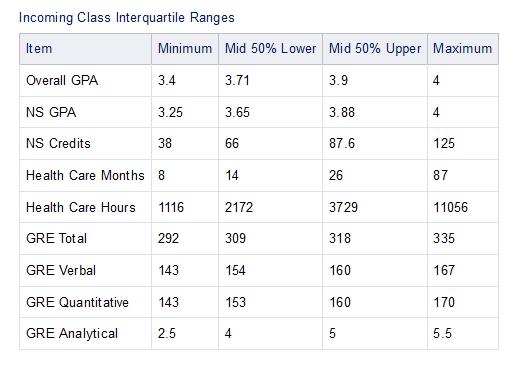
The Duke PA Program is mission-driven and strives to recruit a student population committed to service and increasing access to primary care in rural and underserved communities. The interactions among students with varied backgrounds, experiences, skills, and perspectives contribute to a rich learning environment where students learn with and from each other. This promotes the cultural, civic, and intellectual growth of all students, broadens their viewpoints, and enhances the qualities they bring to the healthcare system and their interactions with patients.
As a professional program preparing graduates to enter clinical practice, we have an obligation to train leaders who can provide quality care, improve access, and strengthen community partnerships within North Carolina, across the United States, and around the world.
In alignment with our mission and values, the Duke PA Program employs a holistic review of applications and considers each applicant’s past performance and potential. We evaluate the following objective measures:
- Overall, natural science, and prerequisite GPA
- GRE scores
- Number of natural science credits
- Number of patient care hours
We value applicants with a broad range of backgrounds and give preference to those who demonstrate a strong match to our mission.
Specifically, we give preference for the following non-academic attributes:
- Leadership
- Record of significant volunteerism
- Multi-lingual (advanced language skills)
- Born and reared in North Carolina; long-standing contributions to North Carolina
- From rural geographic area
- Perseverance through adverse life events
- Experience in primary care
- Experience in underserved communities or populations
- Non-traditional applicant (career change/atypical path to PA)
- Worked full-time while in school
- Economically disadvantaged
- Educationally disadvantaged
- Active military or Veteran
Knowledge of the health care system and PA role, motivation, maturity and personal insight, and good interpersonal skills will also weigh strongly in the admission decision. The most competitive applicants strongly align to our program mission and values of academic excellence, leadership, life experience, and community service.
Admission to the Duke PA Program is very competitive. The following information describing recent candidates will allow prospective applicants to realistically assess their chances of admission, and to plan accordingly.
For the 2025 incoming PA class, 2116 completed supplemental applications were received. Two hundred forty-three applicants were interviewed. Ninety applicants accepted the offer of admission for the Fall 2025 entering class. PA class size is typically 90 students per year.
The ranges of academic and experiential qualifications for the matriculating applicants for Fall 2025 are as follows:

Although this represents the range of qualifications among accepted candidates, each application is evaluated on its individual merits.
Candidates offered admission to the PA Program must undergo and pass a criminal background check and drug screening as a condition of program matriculation, prior to the start of the clinical year, and as needed for either ongoing surveillance or clinical site credentialing.
@DukePAStudents on Instagram
Follow this student-run account for real-time snapshots of what life is like as a Duke PA student.